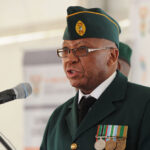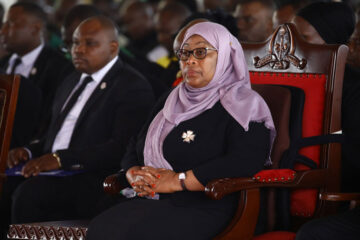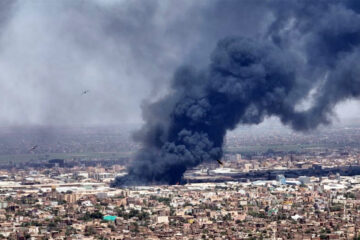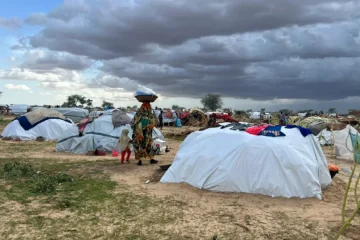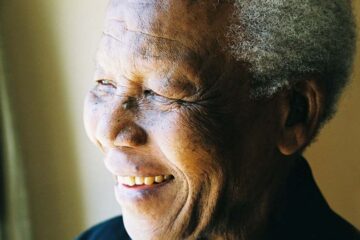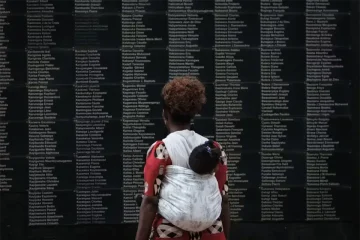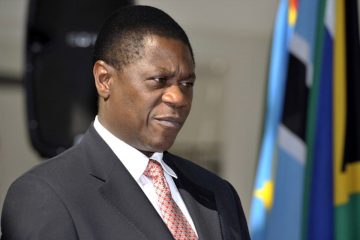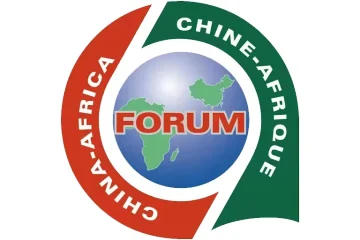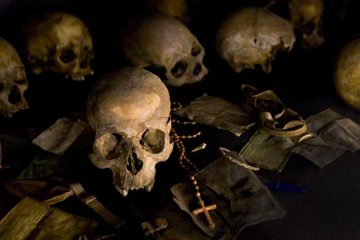GERALDINE FRASER-MOLEKETI

AT comrade Joe Gqabi’s funeral on August 9th 1981, the President of the ANC, OR Tambo, addressed those gathered to mourn: “to say that the enemy has struck us a blow is to tell the truth. He was a positive loss because he was the type of leader who knew how to follow. He was the type of operative who yielded results. He was a leader who in his sector produced results. And it is the test of leadership to be able to produce intended results. Joe Gqabi passed this test with great distinction.”
As we remember Joe Gqabi’s legacy 40 years since his brutal murder by the Apartheid regime, it is important that we reflect upon his contributions as an emblematic figure of our struggle, both as a revolutionary in the struggle for national liberation (freedom and democracy), but also as an outstanding political leader of the ANC.
The story of Comrade Joe includes that of a previous process of strategic renewal, one which should be interwoven in the approaches we must adopt as members of the movement. To honour Joe Gqabi’s legacy is to lead our country through the Renewal and Unity of the Movement. Our governance and leadership cannot be more of the same: a nicely worded statement with a list of mechanistic actions to be undertaken. It must be grounded on a fundamental understanding of the political, economic and social challenges confronting our society today. It must be the formulation of a tangible programme that will yield benefits for society, and provide purpose and direction to cadres because this is what Comrade Joe lived for, and died for.
As we honour Comrade Joe Gqabi’s multifaceted life as a politically and socially engaged figure, rooted in democratic ideals towards a just and egalitarian society, we must draw inspiration from his constant efforts towards organisational work and mobilisation, combined with his militant stature. Indeed, his first political articulation alongside his membership to the African National Congress, as well as its allied Communist Party, remained grassroots oriented with his seminal investigative journalist efforts in uncovering the horrors of Apartheid. Indeed, he was among the first to commit unequivocally to the armed struggle. As a result, he was arrested in 1963 and imprisoned on Robben Island alongside prominent leaders of the struggle such as Walter Sisulu, Nelson Mandela, Govan Mbeki and Ahmed Kathrada.
On the day of Joe Gqabi’s funeral, the National Liberation movement was bitterly reminded how threatened the South African regime was by the effective leadership of our movement working towards the attainment of the national democratic revolution. The extent of the intentions of the apartheid regime in this regard will be dealt with later in my intervention.
Shot nineteen times in the driveway of his residence in Harare, Zimbabwe, the dastardly murder of the revolutionary once again confirmed that meaningful revolutionary action would be met with deathly force at any time.
In his funeral oration on Comrade Gqabi, the President of the ANC, OR Tambo, spoke to his exemplary qualities:
“He moved among the youth – an organiser of the Youth League. He moved among the workers. He was himself a building worker and he started and established a building workers’ union. That union subsequently joined SACTU when SACTU was formed. He has continued throughout to maintain the closest relations with the trade union movement.
“Joe Gqabi took himself to the life of the peasants. In 1960 the resistance to the bantustan system resulted in an uprising, a revolt among the peasants in the Transkei. Joe Gqabi was sent to that area and worked with the peasants in their struggle – and it was an armed struggle of its own kind. He remained there until the enemy had completely crushed the resistance, understandably….”
Gqabi, the investigative photographic journalist:
Around 1952, Joe Gqabi began his investigative efforts at New Age as a journalist and a photographer. His job of exposing the deplorable labour conditions of farm-workers in parts of the country earned New Age the reputation of a voice of dissent at a time when the commercial media was an extension of the Apartheid regime.
The impact of the New Age was felt by the then Minister of Justice, BJ Vorster, as captured in the Hansard, when arguing for the passage of the ‘General Law Amendment Bill’, in the then Apartheid parliament. Vorster regarded the Guardian as “a mouthpiece and propaganda organ of the Communists, and that everyone knew its editor, Brian Bunting, was still an active, outspoken Communist.” Vorster informed the House of Assembly how the newspaper publishers had managed to outwit the state by noting that the moment the Guardian was banned, it appeared in print and on the streets under a different name, the Clarion.
Similarly, when the Clarion, for technical reasons, was forced to abandon its name, it appeared on the streets under the name of Advance. Again, when the publication of Advance was prohibited by the state under the Suppression of Communism Act in 1954, it simply changed its name once more and appeared on sale in the streets as the New Age the very week following the ban. The flabbergasted Minister of Justice reminded parliament that although the old Act and legislation laid down that the state could prohibit and ban newspapers that were spreading propaganda, it encountered such problems.
These challenges arose because the newspaper publishers exploited existing loopholes. Vorster was determined to close these loopholes by presenting an Amendment Bill in parliament. He made no secret of the fact that one of the newspapers which ought to be banned was the New Age which he defined to the House of Assembly as the propaganda organ of the banned Communist Party. Before members of the opposition parties could get excited and oppose his intention, Vorster read out an excerpt of an article published by the New Age to commemorate the Guardian’s 25th anniversary. It included a greeting from ‘Moses M. Kotane, a former general secretary of the banned Communist Party of South Africa’. It read as follows:
The advent of the Guardian in the South African political scene 25 years ago was an important historical event in the struggle of the working class and oppressed people in this country. The Guardian and its successor, Advance, were suppressed by the tyrants and exploiters of this country because…[the oppressed] people’s papers spoke and taught the truth. The glorious tradition and heritage of the Guardian is today being carried on by the gallant little fighter, New Age. In the absence of our organisation which has been suppressed, and the people’s leaders who are banned or banished by the Verwoerd Government, New Age has become our spokesman and the defender of our cause.”
Comrade Joe Gqabi, along with Ruth First and Wolfie Kodesh, had exposed the slave-like condition on the Bethal Potato farms, an exposé which led to the historic potato boycott. Comrade Wolfie Kodesh, in an article in Sechaba (October 1982), described a “gaunt man in tattered clothes who walked into his office at New Age’. The man told a horrific story of ‘starvation and deaths from exhaustion and whippings on the farm, of work bent from sunrise to sunset in long rows picking, picking up potatoes…”
Kodesh with his colleagues Ruth First and Joe Gqabi, immediately drove out to the farm and saw a vision straight from Hades: scarecrow men, shoeless and dressed in sacks, working with hoes along rows of potatoes.”. Kodesh noticed mounds in the fields which, he realised, were the same as those he saw in Ethiopia during World War II. Mounds formed by shallow graves which when kicked revealed corpses. By the time the graves were uncovered only skeletons remained, of people who remained unknown.
Photographs by Comrade Joe Gqabi and articles by Ruth First captured these conditions which led to the ANC launching the historic potato boycott, involving key figures like the “lion of the East” Comrade Gert Sibande, drawing the attention of the country to the harsh conditions on the potato farms, which resulted in the stockpiling of potatoes across cities in South Africa. Of noteworthy mention is that Comrade Joe was nominated for the internationally acclaimed Julius Fuchik Medal that had only been won by Govan Mbeki and Brian Bunting at the time.
Comrade Joe proved practically that working hard within the ANC did not reduce his impact or his role as a Communist. In fact, he saw the task of building the ANC as part of his work as a Communist. In the words of Comrade OR, “he was the type of leader who knew how to follow. He was the type of operative who yielded results. He was a leader who in his sector produced results. And it is the test of leadership to be able to produce intended results”.
Joe Gqabi, MK and the underground:
OR Tambo further described comrade Joe as follows: “By virtue of his calibre as a militant, Comrade Joe Gqabi was selected as the first … of our cadres to be sent abroad for military training. He was the youngest of them…”
Gqabi was one of the first six MK cadres to be sent abroad for military training in 1961, returning in early 1962 to participate in MK’s sabotage campaign.
After the arrest of the ANC, SACP, and MK leadership at Rivonia, Gqabi left the country. He was arrested with 28 others in what was then Southern Rhodesia for attempting to leave the country illegally and was sentenced to two years’ imprisonment. At the end of his term he was re-arrested and sentenced to an additional ten years on Robben Island under the Sabotage Act.
“Gqabi was released in 1975 and immediately joined one of the existing underground structures in Soweto. He initially worked closely with Zwelakhe Sisulu, but often sought ‘advice and guidance on specific issues’ from Albertina Sisulu (according to an interview with Albertina Sisulu conducted by Elinor Sisulu).” He soon became a leading member of the ANC underground centred (around) John Nkadimeng. This structure was also referred to as the Main Machinery.
Joe Gqabi reached out to young people across the political spectrum. In the words of Professor Sifiso Ndlovu, ‘no one forced the youth to take the decision to move into the ANC en masse. They could have gone into the PAC and BCM…”
He had reached youth across the political spectrum. Comrade Joe had the incredible ability to draw people from different sectors of society and across communities and he could adapt to and blend into different contexts.
This culminated in the Apartheid state arresting him, and he was accused number 7 in “The Pretoria 12” trial. He was one of 6 acquitted in 1978. He then went into exile and was appointed as the ANC Chief Representative in Botswana and ran MK operations in the then Transvaal.
Additionally, he raised funding for the establishment of the Congress of South African Students. Comrade Joe was also (one of 6 members), a member of the Politico-Military Strategy Committee of the ANC that developed “the Green Book”.
In 1985, the ANC President Oliver Tambo, when reflecting on Black Consciousness and the Soweto uprisings, said that the ANC had been ill prepared when the Soweto uprising began. He concluded that:
“This uprising of 1976-77, was of course, the historic watershed…. Within a short period of time it propelled into the forefront of our struggle millions of young people…. It brought to our midst comrades many of whom had very little contact with the ANC, if any…. Organisationally, in political and military terms, we were too weak to take advantage of the situation that crystallised from the first events of 16 June 1976. We had very few active units inside the country. We had no military presence to speak of. The communication links between ourselves outside the country and the masses of our people were still too slow and weak to meet (the favourable situation) such as was posed by the Soweto uprising.”8
Tambo pointed to the role ANC members played, saying:
“An outstanding role in this situation was, however, played by those of our comrades who were inside the country, many of them former Robben Island prisoners. Through their contact with the youth, they were able to make an ANC input, however limited, in the conduct of the bloody battles of 1976-77…. Among them we would like to select for special mention the late Comrade Joe Gqabi, former Robben Island prisoner,… [who was assassinated] because [the enemy] could see that the seeds he had planted among the youth in Soweto 1976, hardly a year after his release from prison, and in the subsequent years, were bearing bitter fruit for the oppressors and, for us, magnificent combatants for the liberation of our country…. The participation of the comrades we have spoken about, in assisting to guide the Soweto uprising, once more emphasised the vital necessity for us to have a leadership core within the country, known by us and in touch with the people, dedicated, brave, with clear perspectives and thus able to lead”.
Separately in “The 1977 Political Report adopted by the Plenary Session of the Central Committee of the SACP” reached the following conclusion on the Soweto student uprising:
“The events in what has become known as the Soweto revolt are not isolated happenings; they have their roots in the crisis which has been building up at every level of socio-economic structure…. The intensity of the Soweto events reflects the development over the years of these people’s reactions to the growing crisis of apartheid. At the political level, unbroken efforts by our Party and a whole liberation movement, headed by the ANC, maintained that spirit of resistance, and helped lay the foundation for the growth of the heightened revolutionary mood which is in evidence. And, amongst large numbers of the new militants thrown up by the activities, there is a growing awareness of the liberating ideas of Marxism-Leninism and a search for the correct politics of social revolution. “
Inspired by these changed conditions, the ANC leadership saw the urgent need further to intensify the struggle to overthrow the apartheid regime. As part of this, it sent a delegation, led by President Tambo, to the Socialist Republic of Vietnam to study the experience of a struggle which had defeated the powerful US imperialist hegemon.
In October 1978, a joint National Executive Committee and Revolutionary Council meeting (Luanda, 27 December 1978 to 1 January 1979) received the Report of the delegation to Vietnam.
After discussing this Report, the meeting observed, among others, that “the Vietnam experience reveals certain shortcomings on our part and draws attention to areas of crucial importance which we have tended to neglect.”
It then decided to establish a Committee to draft a document on what the Movement should do in the light of the lessons drawn from the struggle in Vietnam.
This became a Commission of six members headed by OR Tambo that included Thabo Mbeki, Joe Slovo, Moses Mabhida, Joe Gqabi and Joe Modise. The Commission, known as the Politico – Military Strategy Commission, submitted its report popularly known as “The Green Book”, to the ANC in August 1979.” (SADET: The ANC’s Diplomacy and International Relations.) This signalled a shift in the debate/discussions among the ANC leadership on our approach to waging a People’s War.
Zimbabwe:
The deliberate and conscious decision by the ANC to deploy Comrade Joe Gqabi as Chief Representative to Zimbabwe was in order to build relations with the Zimbabwe government led by ZANU. A particular challenge in this regard was that the ANC had a historic alliance with ZAPU.
As stated by OR Tambo in his funeral oration on 9 August 1981 “Joe Gqabi was capable of making friends across political and ideological barriers, across colour lines. He communicated with ease and effortlessly with generations: young and old….”
His mission was to build a solid fraternal relationship with the ZANU government and this he did successfully. The success was evidenced years after his assassination when Zimbabwe would be the country to host the OAU Sub-Committee on Southern Africa which adopted the Harare Declaration in October 1989. Led by President OR Tambo, the ANC leadership drew up this Declaration to prepare for negotiations with the apartheid regime. This was also after the last underground SACP Congress, in Cuba, had adopted its new Programme, entitled the Path to Power.
The assassination of comrade Joe:
James Sanders writes that: “On 31 July 1981, the ANC representative in Zimbabwe and newly appointed deputy head of intelligence Joe Gqabi was assassinated outside his house in Harare. The TRC later reported that Gqabi was ‘killed by a South African hit squad acting on the basis of intelligence supplied by the agents of [the] Military Intelligence Division (MID) South Africa operating from inside Zimbabwe’s CIO (Central Intelligence Organisation)10”. The MID agents were Colin Evans and Philip Hartlebury: they were later exposed and, after interrogation, confessed to their role in Gqabi’s killing. In 2004, the Johannesburg Sunday Times announced that Gray Branfield, aged fifty-five, had been killed in Iraq where he worked as a security contractor. The author Peter Stiff confirmed that Branfield was a former detective inspector in the British South Africa Police (BSAP), Rhodesia, who had joined the Barnacle death squad after moving to South Africa in 1980. Branfield had privately revealed that he was one of the assassins who had murdered Joe Gqabi twenty three years earlier.11
“It should be noted that “Testifying before the TRC, Major General Joubert, the officer who commanded the Special Forces between 1985 and 1989, disclosed that ‘in the mid-eighties to the late eighties’, probably 1986, Barnacle was transformed into the Civil Cooperation Bureau (CCB). The CCB was intended to engage in ‘clandestine and covert operations’ within South Africa. Joubert listed the tasks of the CCB as the destruction of ANC facilities and support services’ and the elimination of ‘ANC leaders’ and ‘activists, sympathisers, fighters and people who supported them.’ … The report continued:
Mr Christoffel Nel who was the CCB head of intelligence, explained that the CCB was a long term project which required at least a ten year gestation period… The goal was to create a global subterranean network of companies that would be both legitimate businesses as well as fronts for operational intelligence… Joe Verster (Major PJ Verster “Joe”) confirmed the long term nature of the CCB project. He described the goal as setting up a ‘first line of defence’ outside the country… The intention was that the CCB would be fully functional sometime in the mid-1990’s. Based on the experience of other intelligence agencies, it was recognised that it would take long for a skilled soldier to transform her/himself into a career business person…”
Peter Stiff writes in, Cry Zimbabwe, that:
“In late 1980 or early 1981 it was decided at the highest level of the South African government that the ANC’s top 50 externally based officials should be assassinated. In the first instance it was ordered that they should be tackled as targets of opportunity, but it was later changed to ensure that prior authorisation was always sought first. The general assassination operation was coded Operation Mixer. The first approved target was Joe Gqabi and the attempt to assassinate him was code-named Operation Mixer.”
We are aware that the first failed attempt in Zimbabwe was on 24 February 1981 when the placing a device/car bomb which was foiled when detected by Shadrack Ganda, a trained cadre. Comrade Joe was out of Zimbabwe at the time. “Five months later the task was passed to Project Barnacle. Four teams were tasked for the operation.” (Peter Stiff, Cry Zimbabwe, p. 59) The specific operation was from Tuesday, 6 July 1981 until Friday, 31 July 1981. “Team 3 arranged the exfiltration of Major Brian’s team and they boarded a light aircraft at Nduma Airfield and flew to Messina.
“In May 1986 a South African Recce team raided Harare and blew up the ANC’s main office at 16 Angwa street, Harare and razed 29 Eves Crescent to the ground.”
The words of OR Tambo at the funeral on 9 August 1981 ring true as we review this information today … He said then, “His assassination, however, is not an isolated act. It is, as the enemy himself says, part of a total offensive against leaders of the ANC, against the liberation movement in all its contingents in South Africa… a bid to destroy all! It is part of a campaign of terrorisation in this whole region; a refusal to acknowledge the independence of African countries; an attempt to defeat that independence. It is part of a struggle for the survival of racism and colonialism in Africa. It is part of an imperialist offensive. Therefore, there will be more Joe Gqabis to bury. There will be more Chomoios, more Kassingas, more Sowetos.”
The question arises whether the reactionary forces as described by Mr Christoffel Nel who was the CCB’s head of intelligence, and described that “the CCB was a long term project which required at least a ten-year gestation period… The goal was to create a global subterranean network of companies that would be both legitimate businesses as well as fronts for operational intelligence… “ whether it was indeed dismantled. And it begs the further question, whether operatives like Major General Joubert, the officer who commanded the Special Forces, and Major Joe Verster, and their networks have ceased to exist? Were these machineries completely dismantled during the transition to democracy or could they be the kernel of the counter revolutionary forces which the 1997 ANC Strategy and Tactics document warned about when it said:
“Counter-revolution can be defined as a combination of aims and forms of action that are mainly unconstitutional and illegal, to subvert transformation.
“(These actions) also entail underground efforts to undermine the country’s economy, including investor confidence and currency; deliberate acts of corruption driven not merely by greed; sabotage of the programme for delivery; wrecking the government’s information systems; illegal and malicious acts of capital flight and so on…
“Uppermost in the immediate objectives of these counter revolutionary forces is to disorganise, weaken and destroy the ANC, the vanguard of the NDR, both from within and from outside its ranks. It is in the interest of these elements that the masses of our people should be left leaderless and rudderless, and thus open to manipulation against their own interest.
“In this sense, therefore, the democratic movement will be committing a monumental blunder – a historical error of great proportions – to lull itself into a false sense of security. Maximum vigilance is required…
“Counter revolutionary mobilisation can only take root if there are real grievances to exploit, whether these grievances are deliberately engineered or not. The democratic movement itself needs to be vigilant at all times to be vigilant that its own actions and omissions do not assist such mobilisation.”
What can we learn from these reflections on Cde Joe Gqabi:
Throughout his life of struggle, Comrade Joe Gqabi did his best to help ensure that the organisations of which he was a member, the ANC, the SACP and the trade unions were strong and principled, and characterised by members driven by a high sense of integrity and a selfless commitment to serve the people.
Since the December 2017 54th ANC National Conference, the leaders and members of the ANC have spoken repeatedly about the need for the Unity and Renewal of the Movement.
That National Conference explained specifically why it was vitally important to Renew the ANC. For instance, it said:
“(There is) A loss of confidence in the ANC because of social distance, corruption, nepotism, arrogance, elitism, factionalism, manipulating organisational processes, abusing state power, putting self-interest above the people. Even the strongest ANC supporters agree the “sins of incumbency” are deeply entrenched. Many organisations and thought leaders have become critics of the ANC and its leadership and we are losing much of our influence and appeal among students, young intellectuals and the black middle class…and,
“(There are also) Leadership weaknesses and loss of integrity, characterised by competition to control state resources, factionalism, conflict, ill-discipline and disunity, and the use of state institutions to settle differences. Slates and vote buying have delivered leaders who have difficulty driving our programmes or commanding respect from society and our supporters.”
Most certainly this was not the ANC of Joe Gqabi. Truly to honour him requires that we ask ourselves the question – what should we do, as Joe Gqabi would have done, to Renew the ANC so that it becomes like the ANC which led our country and people to liberation?
Inevitably in this regard we would have to look at the quality of today’s members of the ANC.
The then ANC SG, Comrade Gwede Mantashe, delivered a Diagnostic Organisational Report at the June 2017 ANC Policy Conference. Among other things he said:
“The consciousness of an individual can be influenced by the material conditions one finds himself or herself in. We owe it to ourselves first, the movement and society, to analyse in detail the implications of a liberation movement that has ascended to power and, therefore, controls huge resources. Being in power is rapidly becoming a source of political bankruptcy, in that members of the ANC fight for deployment either as councillors, MPLs and MPs – respectively, as if there is ‘no tomorrow’. In the last Local Government Elections, infighting was a common factor everywhere – be it in the Nelson Mandela Bay Metro, Tshwane or with the political killings in KZN, or in some parts of the Eastern Cape -where our electoral support decreased. It is foreign to our movement for comrades to see deployment as a source of material benefit rather than the reason to serve the people. These fights among comrades turn the interest of our people off, and push them away from the movement.
“The use of money to buy votes for elections in the party, is at the heart of the decline of the quality of structures across the board. Money has replaced consciousness as a basis for being elected into leadership positions at all levels of the organisation. The ethical behaviour of leaders is no longer an issue, as it has been replaced by status. Ethics is seen as an elitist approach to politics and has developed social distance as an effect. Social distance accelerates the growth of the trust deficit between leaders and society, leading to decline of support for our movement.”
Much earlier, at the 1997 ANC National Conference, President Mandela had also addressed the matter of the quality of the ANC members. He said:
“…A number of negative features within the ANC and the broad democratic movement have emerged during the last three years…
“One of these negative features is the emergence of careerism within our ranks. Many among our members see their membership of the ANC as a means to advance their personal ambitions to attain positions of power and access to resources for their own individual gratification…
“(There are also those among our members who) see our movement for national liberation as a mere political party which participates in elections at the conclusion of which it places its members in remunerated positions of authority…”
Joe Gqabi was not this kind of ANC, SACP or MK member and neither were the other cadres who were his Comrades.
It therefore seems clear about what should be done to Renew the ANC.
The ANC must take steps to ensure that it produces members who are like Joe Gqabi. Together they must restore the ANC to its historic position as the hope of the masses of our people – no longer one in which the people have lost confidence!
Those who are genuine revolutionary democrats and loyal and principled servants of the people will have to work out what should be done to achieve these goals.
What is clear is that if the ANC does not carry out this process of Renewal, it will perish.
What is also clear is that the ANC can only talk seriously about its Unity during and after its process of Renewal.
That Renewed ANC would also have to look seriously at what needs to be done to further the National Democratic Revolution, free from the paralysing and distorting influence of factions, including by agents who were infiltrated into the ranks of the Movement to achieve objectives set by the apartheid regime.
One of the questions we may ask today is:
Who is reaching out to the Youth, who is providing leadership to the Youth and recognising their inter-generational role?.
Gqabi’s essence as a political fighter is perhaps captured best through what Fanon described in ‘The Wretched of the Earth’ that:
“To educate the masses politically does not mean, cannot mean, making a political speech. What it means is to try, relentlessly and passionately, to teach the masses that everything depends on them; that if we stagnate it is their responsibility, and that if we go forward it is due to them too, that there is no such thing as a demiurge, that there is no famous man who will take the responsibility for everything, but that the demiurge is the people themselves and the magic hands are finally only the hands of the people.”
Do we as political activists resonate in this way with the next generation or is our membership of the Movement seen simply as a requirement for personal career advancement.
To connect with the legacy of Cde Joe Gqabi, means that we must work to ensure that the generation born in our democratic dispensation must be grounded on understanding of the continuity of a political programme and leadership. It also means that simultaneously, the new generation must achieve a fundamental understanding of the political, economic and social challenges confronting our society today.
Today more than at any moment as part of our Renewal as a movement we need the likes of Joe Gqabi who taught and lived with the youth … in the words of OR – “Joe leaves a record in our struggle which will be surpassed by few. He was certainly a seasoned leader of outstanding ability.”
Joe Gqabi the communist understood the relationship between the SACP, ANC and SACTU and therefore the objective basis of the Tripartite Alliance. He played a leading role as a leading ANC member, deeply involved in the various stages of the struggle for the national democratic revolution. He understood the role of the ANC in the national democratic revolution and also fully understood the role of the SACP in the struggle for a socialist revolution.
The “difference between the national democratic and socialist revolutions” was clearly articulated at the June 2007 ANC Policy Conference as “…a distinct, material and historically determined difference between the national democratic and the socialist revolutions. Objectively, and not by proclamation or conference resolutions, the ANC necessarily serves as the leader of the forces committed to the victory of the National Democratic Revolution, which struggle for the realisation of the national democratic goals of the masses of our people.
14
“For many decades already, our movement, the African National Congress, precisely because it accepted and supported the right of our people to choose their path of development, accepted the proposition that our ally, the SACP, and not the ANC, would lead the forces and the struggle for the victory of the socialist revolution”.
An important question which arises in this regard is – what Programme has the SACP developed to succeed the ‘Path to Power’, which was obviously overtaken by events?
This question is directly related to the important matter of understanding what the SACP is doing to organise for the victory of the socialist revolution? Of course, this also relates to the matter of organic relationships among the members of the Alliance.
Obviously, given the political victory of the NDR in 1994, these Alliance relationships cannot be the same as those during Joe Gqabi’s time.
Conclusion:
At times it is easy to be overwhelmed by the challenges we face. However it is important that we take a moment to recall efforts made during the most trying of times to achieve our democratic dispensation.
Reflecting on the life and death of Cde Joe Gqabi starkly reminds us about the bitter confrontation between Revolution and Counter Revolution.
These two forces represent on one hand the hopes of our movement and our nation, and, on the other a perspective of fear and despair. This contrast obliges us always to assess how we conduct the process of Renewal and Leadership. The Counter Revolutionary forces are not an abstract spectre. They are active agents with an agenda which seeks to amplify and exploit disagreements and divisions in our Movement to reverse our progress and divide our people.
Whilst the counter-revolutionaries may be clothed in our colours and speak our language, their purpose is to divide us and defeat the democratic revolution. They flourish in the space created by factionalism and the absence of progressive vigilant leadership.
The NDR is more than the attainment of democracy. It is about creating a better life for all. Many in our country, including people in our ranks, have never understood the revolutionary import of the objectives stated in the National Constitution of building a non-racial and non-sexist South Africa! It is very obvious that such a South Africa would require a fundamental socio-economic transformation of our country, starting with the eradication of the legacy of colonialism and apartheid.
This is exactly what the Alliance united to achieve as it joined hands to ensure the victory of the NDR. The recent attempts to put on a high pedestal the phrase “radical socio-economic transformation” as though this is something new to the Alliance, is nothing but fake news.
Exposing the agents of counter revolution and their agendas of division and destruction of our movement and the revolution is a central task of all progressive forces. The seeds for their manipulation of our democracy were laid back in the 80’s and have not been uprooted.
We will recall that earlier I reported on the decision taken by the apartheid regime at the end of the 1970’s and the beginning of the 1980’s to eliminate the top 50 externally based leaders of the ANC. Joe Gqabi was the first victim of that counter-revolutionary decision.
Bearing in mind the warning given in 1997 in the ANC Strategy and Tactics document, and as we remember and pay tribute to Joe Gqabi, we must remind ourselves that the same counter-revolution which murdered Joe Gqabi remains alive and pursues the objective to defeat the democratic revolution.
The material drawn on by James Sanders, in his book Apartheid’s Friends: The Rise and Fall of South Africa’s Secret Service”, indicates that the plans for counter revolution were hatched back in the late 70’s and early 80’s.
The Sanders account points to the correctness of the ANC Strategy and Tactics adopted by the 50th Conference of the ANC, which said: “Counter revolutionary mobilisation can only take root if there are real grievances to exploit, whether these grievances are deliberately engineered or not. The democratic movement itself needs to be vigilant at all times to be vigilant that its own actions and omissions do not assist such mobilisation.”
Some may ask the questions, have these reactionaries found allies in our own ranks or, have some of them always been in our ranks? Have we dropped our vigilance as a Movement, including the Tripartite Alliance, when we have allowed factions to tear the Movement apart?
The bigger worry is whether the current challenges within the larger Movement allow these forces enough confidence to intensify their offensive to cause more damage than they have already done!
That damage has included the weakening of the institutions of the democratic State, including those in the criminal justice sector, the virtual destruction of the State Owned Enterprises, the subversion of progress towards a better life for the people, the alienation of our country from the rest of our Continent, and the weakening of the Alliance organisations and the democratic movement as a whole.
Comrade Joe Gqabi paid the ultimate price on 31 July 1981 …. and we can mention many others whom the apartheid regime murdered. These include Dulcie September, Ruth First, Jeanette (and her six year old daughter, Katryn Schoon). Their crime was that they were determined and principled combatants for the Liberation of our country. Thus did they become targets of the decision described as “the tasks of the CCB (of) the destruction of ‘ANC facilities and support services’ and the elimination of ‘ANC leaders’ and ‘activists, sympathisers, fighters and people who supported them.”’
Today we remember a revolutionary Comrade Joe Gqabi who was assassinated because of his commitment to the victory of the National Democratic Revolution. Posthumously he was admitted into the honoured ranks of the Order of Luthuli in Silver for his excellent contribution towards a non-sexist, non-racial, just and democratic South Africa.
Our leader and Comrade, Joe Gqabi, sacrificed his life so that future generations should enjoy continuously improving lives in a non-sexist, non-racial, just and democratic South Africa.
Our tribute to Joe Gqabi must consist in our firm commitment that we will never allow anything, including the counter-revolution, to defeat the objectives for which he laid down his life.
- Geraldine Fraser-Moleketi delivered the Joe Gqabi lecture hosted by the Harry Gwala Foundation.



